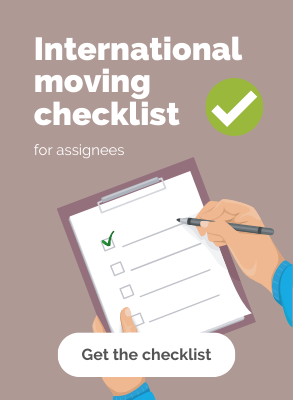
Relocating employees globally can be complex to start with, but there are additional considerations and challenges facing LGBTQ+ employees that are important for Global Mobility teams to consider.
This is not only an important aspect of your duty of care to employees but also ensures organisations can continue to develop and retain ALL their talented staff.
Why is this an important topic?
Here are some quick facts about LGBTQ+ people in the global mobility landscape to highlight the importance of understanding and addressing the challenges faced:
- More than a third of LGBTQ+ staff have hidden that they are LGBTQ+ at work through fear of discrimination.(1)
- 64 Countries have laws that criminilise homosexuality. (2)
- 12 Countries impose (or at least have the possibility of imposing) the death penalty for private, consensual, same-sex sexual activity. (3)
- In more than half the world LGBTQ+ people are not protected from discrimination by workplace law. (4)
- Most governments deny trans people the right to legally change their name and gender from those that were assigned to them at birth. (5)
- 1/4 of the world's population believes being LGBTQ+ should be a crime. (5)
When you combine the risks and difficulties faced by LGBTQ+ employees who are relocating with the fact that sexual orientation and gender identity are invisible characteristics that many employers won't be aware they need to support you can see why raising awareness and having an understanding of the topic is so important.
CHALLENGES FACED BY LGBTQ+ EMPLOYEES RELOCATING INTERNATIONALLY
LGBTQ+ Staff can face varying experiences depending on where they are in the world. Some of the key challenges facing LGBTQ+ individuals when considering or undertaking an international relocation include:
Lack of Recognition:
- of relationships
- of parental rights
- of gender
This lack of recognition can provide significant barriers for international relocation. Navigating the Visa and Immigration process can be a particular challenge for LGBTQ+ families where dependents may not be issued visas without workarounds in place. Another example is where transgender employees are unable to obtain a national ID card reflecting their gender identity.
Lack of Rights:
- Prohibition of LGBT organisations
- Freedom of expression restricted
- Access to Healthcare
Another example may be a transgender or non-binary person being banned or harrassed when using the public bathroom they feel safest in based on their gender identity and expression.
Criminalisation:
For instance, in some countries, sexual activities or even displays of affection between same-sex individuals are illegal and punishable by imprisonment, corporal punishment, or death. In these locations, LGBTQ+ employees are at significant risk of arrest or harassment by local authorities.
Lack of Protection:
- no legal protection from discrimination at work
- no legal protection from discrimination in provision of goods and services
- no hate-crime laws
For example, LGBTQ+ employees may be denied from renting accommodation if their identity is against the beliefs of the landlord.
Societal Attitudes:
Social attitudes and behaviours are not always reflective of the legal landscape for LGBTQ+ employees. Even in countries where the legal situation protects employees they may still face:
- Non-acceptance
- Exclusion
- Harassment and Violence
Not only is safety a consideration here, but these attitudes can also significantly affect an assignees ability to settle and integrate into their host location.
Note: this can work both ways, some countries without pro-LGBTQ+ legal protection may actually, more openly promote and accept diversity so employees may feel more comfortable accepting an assignment, despite that.
How can GLOBAL MOBILITY support LGBTQ+ employees?
Facilitating Open Discussions
A major challenge in supporting LGBTQ+ employees is that sexual orientation and gender identity are not always readily apparent charachteristics. Unless this information is disclosed it is hard to know that additional support may be required. One idea is to have an 'opt in' process where employees can share which opportunities they may be interested in in the future, including countries they'd be happy to relocate to.
More than a third of LGBT staff hide who they are at work
- Stonewall
To facilitate open discussions organisations can:
- Try to create a safe atmosphere where employees feel comfortable to speak about their own identity and family. Demonstrating allyship, a commitment to duty of care and the company's overall approach to DEI can help.
- Ensure full confidentiality.
- Train staff on how to facilitate discussions.
- Ensure there are channels for employees to raise their concerns confidentially and independently of their line managers. (LGBTQ+ Employee networks can provide a point of focus for those employees who don't feel comfortable speaking to HR or their line manager).
- Make information for LGBTQ+ assignees accessible for every assignee, regardless. This allows those who need information to self-select and engage in the process.
How to support LGBTQ+ staff Pre-Assignment:
Policies
- Ensure that policies explicitly prohibit discrimination and harassment. Regularly review DEI policies to ensure they meet or exceed legal requirements and are consistently applied globally.
- The best organisations work collaboratively with assignees who encounter challenges to find alternative options that support their career development and avoid any potential roadblocks - for example, looking at alternative locations, assignment types or workarounds.
Case Study: A gay couple relocating to San Francisco in 2008 were in a civil partnership which meant that legally the partner could get a visa, but on arrival the border guard wouldn’t issue it due to his own moral beliefs. To get around this the employer found a role for the accompanying partner to allow him to get his own work visa. (The International Dual Careers Network helps find career opportunities for accompanying spouses where this is not an option or a good fit).
- Ensure that LGBTQ+ considerations are included in your policy, for example, Immigration, Healthcare and family benefits.
Support
- Evaluate if additional support services should be authorised for LGBTQ+ staff and/or extended to family members (for example Cultural Training or Career Support to obtain own visa).
- Make sure staff are fully informed about LGBTQ+ considerations for their destination so they understand what to expect and can prepare accordingly (Include this in information packs for all staff to ensure it reaches those who may not be out in the workplace).
- Provide country information resources such as the legal situation, access to medical support, prevailing cultural attitudes, staff experiences, neighbourhoods, venues and support groups etc.
- Include LGBTQ+ considerations in risk assessments. and safety briefings.
- Plan for risks - for example, in countries where only the biological mother can be recognised as a parent it's important to understand what happens in the event of sickness or death on assignment. You can't eliminate all risks but you should aim to manage them and have contingency plans in place.
- Make sure all of your relocation service providers are on board and trained on LGBTQ+ issues so that they can brief you on best practice and solutions in their sector and can sensitively support your assignees when they need to.
- This goes beyond immigration providers and the technicalities of relocation - think about schooling for example; understanding a school’s Diversity and Inclusion agenda will be important for dependents of LGBTQ+ assignees or those who are LGBTQ+ themselves, or cultural training where knowledgeable and experienced trainers should include LGBTQ+ considerations in their programme.
- Evaluate how your provision for healthcare supports transgender employees, for example, continued access to hormone replacement therapy and their safety or ability to access healthcare overseas (LGBTQ+ people frequently report facing cases of medical providers denying care or facing harassment or discrimination when seeking routine healthcare (6)).
- Consider assigning internal buddies to support new assignees before and during the assignment.
Training
- Raise awareness and make sure GM staff understand the challenges and policies. Conduct regular training sessions with mobility staff and in-country managers to discuss real-world scenarios and best practices for supporting LGBTQ+ employees. For instance, a company might hold a workshop where experienced expatriates share their experiences and strategies for navigating challenging environments.
- Evaluate how to best encourage staff who are 'out' to voice their concerns. Train staff on how to have sensitive conversations. There is sometimes a fear of having conversations with employees that could become sensitive or litigious.
- Keep track of legal developments to ensure all information is kept up to date. Stonewall offer a series of Global Workplace Briefings available at www.stonewall.org.uk/briefings.
- Train on Bias which may be a problem when selecting candidates for assignments (e.g. the assumption that someone may not want to relocate to a specific location because of their identity).
 Photo by RDNE Stock project
Photo by RDNE Stock project
How to Support LGBTQ+ Staff On Assignment
- Offer equal benefits to same-sex partners.
- Avoid outing LGBTQ+ employees (intentionally or unintentionally).
- Provide training to in-country managers and colleagues (for example to avoid the risk of inadvertently outing a colleague when travelling together).
- Support LGBTQ+ staff networks. Where these can't exist for safety reasons (e.g. by association members would be putting themselves in danger) consider other ways to support employees from overseas.
- Consider home and travel security for employees in particularly high risk regions.
- Be ready to support staff if things go wrong, whether that's simply with advice or a need to return home quickly in an emergency.
- Check in regularly - don't just assume that because you haven't heard from them that everything is ok.
How to Support LGBTQ+ Staff Post Assignment
- Remember that returning home can cause problems for LGBTQ+ assignees too. For instance, should an employee decide to reveal their LGBTQ+ identity during their assignment but faces the prospect of returning to a hostile home country, or if they form a relationship that is not accepted in their home environment while on assignment, it becomes crucial to address repatriation considerations.
Ongoing Support and Feedback
Finally, establish ongoing support and feedback mechanisms to continuously improve the support provided to LGBTQ+ employees. Regular check-ins, anonymous surveys, and open forums can help gather valuable insights and address any emerging issues promptly.
Supporting LGBTQ+ employees in global mobility is not just about compliance with legal standards; it is about fostering an inclusive and supportive environment that respects and values diversity. By understanding the unique challenges faced by LGBTQ+ assignees and implementing comprehensive support measures, organizations can ensure the wellbeing and success of all their employees, no matter where they are in the world.
Where to find more information:
The information in this article is a combination of the experiences of Bournes Team in supporting LGBTQ+ customers all around the world, combined with best practices discussed by Stonewall and a panel of in-house global mobility experts at our previous event 'Supporting LGBT Staff on Assignment' and information from a range of credible sources (all cited where referenced).
If you would like further information below are a number of suggestions:
- Local NGO's and LGBTQ+ networks provide resources on up to date country specific information.
- The International Lesibain, Gay, Bisexual, Trans and Intersex Association (IGLA) offers further resources and country specific information as well as a global knowledge base (IGLA World Database)
- Your organisations Diversity and Inclusion team and LGBTQ+ networks may be able to provide further guidance.
- Stonewall's Diversity Champions programme is the UK's leading best practice employers' forum for sexual orientation and gender identity equality, diversity and inclusion. They provide knowledge, best practice and detailed country briefings as well as support reviewing policy, action planning and training. Find out more about becoming an Inclusive Workplace.
- Stonewalls Global Workplace Briefings advise employers about the legal and socio-cultural workplace situation in each country.
- The International Gay and Lesbian Travel Association includes LGBTQ+ travel tips and safety advice for many global locations.









